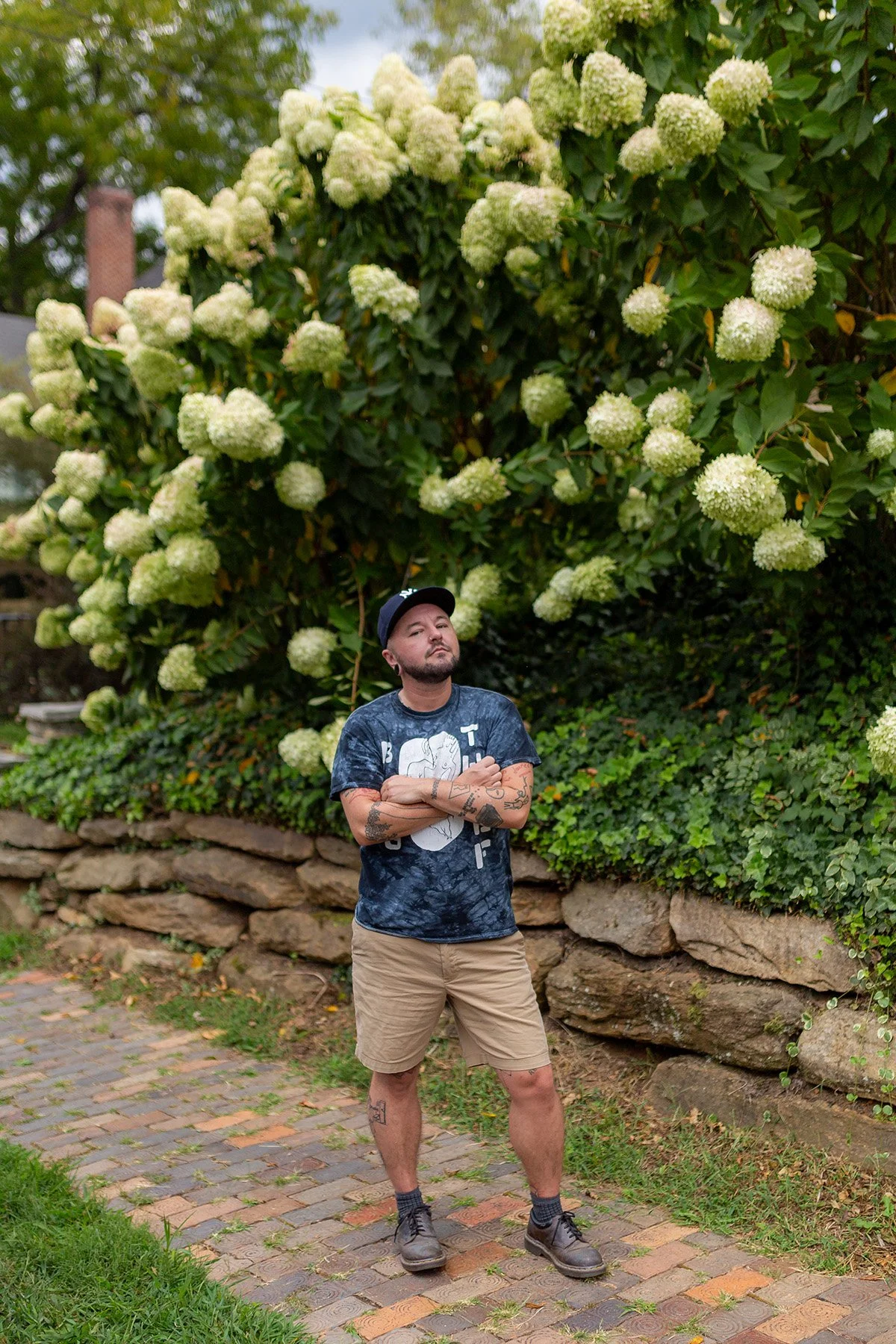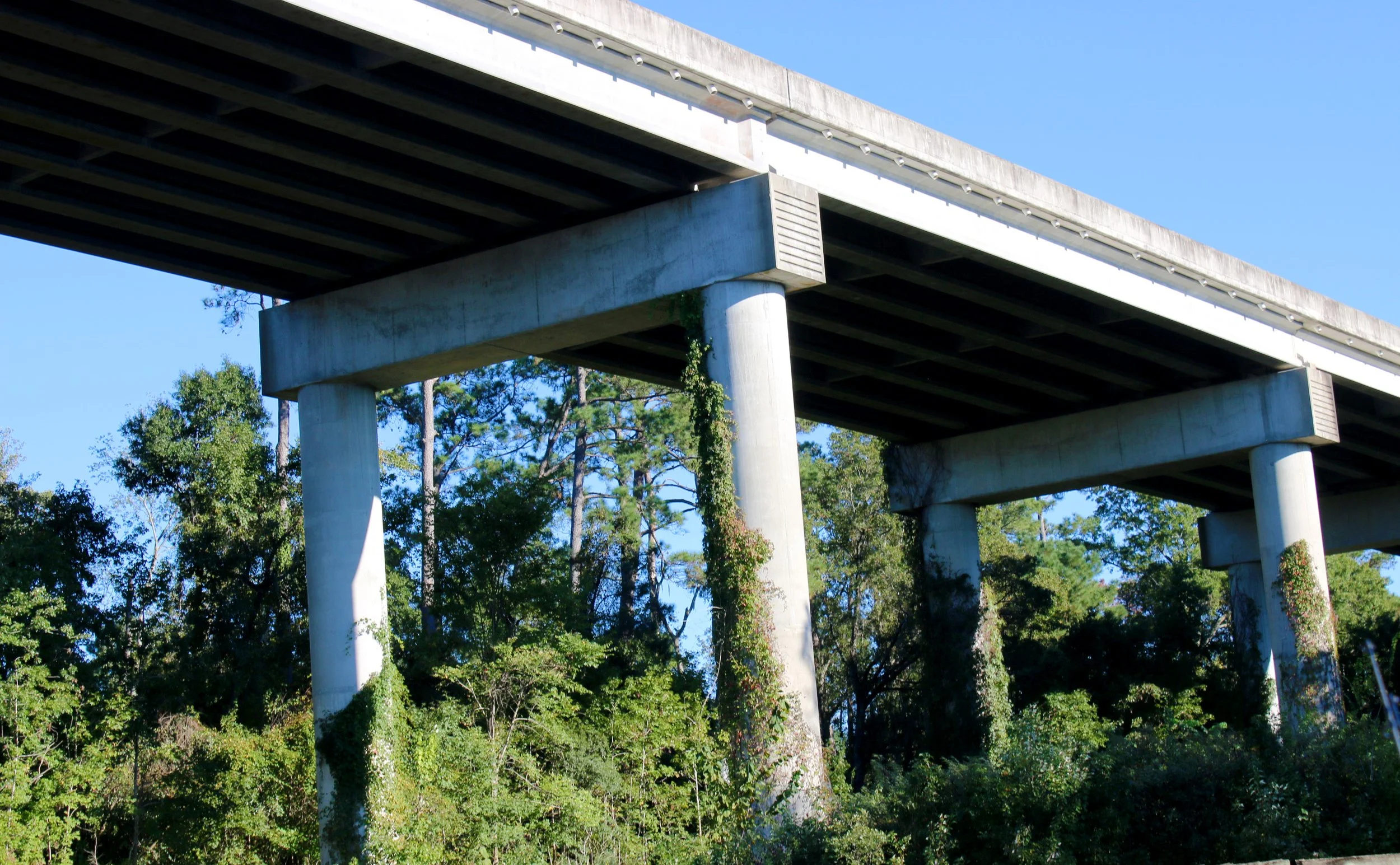bvs252@nyu.edu

Basil
I'm a Southern man of trans experience, a first-generation college graduate, from an impoverished white trash background. I predominantly grew up in the Peedee area of SC and lived in the Lowcountry of SC as well as Western NC in Appalachia. I lived in Florida as a small child and resided in New Orleans for a time.
Intracoastal Waterway in Socastee, SC
I created this body of work to expose and use my ancestors' history, including nonancestral white colonizers outside of the Southeast, as I reveal and unsettle the framework that informs the present-day punitive society that has influenced the South since its inception. This work is just as much devoted to deconstructing the ontological past that aids the prison system in the United States as it is to push myself and other white Americans to unravel our country’s history and its current-day incarceration system with an end goal of devising a structure towards abolition in the Southeast.
Why Prison Abolition is Important to Me:
Prison abolition and economic justice are family issues.
1 out of every 12 children living in the U.S. has experienced parental incarceration at some point in their lives. More than 5.7 million children under the age of 18. (Gosch)
1 in 4 Black children have had a parent who has been incarcerated compared to one in 25 white children (Sentencing Project). While parental incarceration is staggering regardless of race, with more than half of all incarcerated people being parents, the racial disparities are harrowing as two-thirds of incarcerated parents identify as BIPOC. On any given day, a Black child is seven times more likely to have an incarcerated parent than a white child, and Latinx children are twice as likely. While the data for Native children is not known nationally, Oklahoma data demonstrates that Native children are twice as likely as white children to have an incarcerated parent.(Nellis) At the same time, in both the Dakotas, they are about five times more likely (The Next 100).
Children living in poverty are more than three times as likely to have experienced the incarceration of a parent than children in families with incomes at least twice the poverty level (Department of Justice).
80% of the women incarcerated today are mothers. Prisons directly harm and dismantle the notion of a family unit, which many religious white legislators use as a talking point, and create intergenerational trauma. (Bertram and Sawyer)
(image: Basil's mother who had Basil at 18 years old and his brothers. Kim, his mother, passed away in 2019.)
As a survivor of abuse and poverty, I am committed to transformative justice spaces and moving away from the carceral ideas implemented in familial healing and trauma. I recently took an ACE (adverse childhood experiences) test and scored an 8 out of 10. (ACE). I was also diagnosed with CPTSD years ago. I understand how trauma can affect one’s brain and actions. I know what it can feel like to feel trapped, hopeless, and desperate. When people act out of trauma, they don’t need that trauma compounded by going to prison. They need help and resources.
To care about familial trauma, ending abuse, and stopping sexual assault and violence, one should care about ending the cycles of these things that prisons perpetuate.
Trauma is at the root of a majority of incarcerated lives
According to a study by Nancy Wolff and Jing Shi, male inmates experienced more physical trauma than sexual trauma independent of the age of exposure. Across all types of trauma, trauma exposure rates were higher before 18 than in adulthood. White and other racial groups reported experiencing more physical and sexual trauma before 18 than their black counterparts. Hispanic inmates are similar to black inmates in their physical trauma rates but more similar to White and other racial group inmates in their exposure to sexual trauma. (Wolf and Shi)
Incarcerated women had a significantly higher experience within four of the five categories of trauma exposure than matched controls in the general population. (Wolf and Shi)
The lifetime prevalence of PTSD was significantly higher among incarcerated women than women in the matched control group (40 percent vs. 12 percent ), and incarcerated women were also more likely to report having used drugs in response to their most traumatic event (64 percent vs. 6 percent)
(Grella,Lovinger, & Warda)
An extensive 2014 study found that 30% to 60% of men in state prisons had post-traumatic stress disorder (PTSD), compared to 3% to 6% of the general male population. (Widra)
CLass Difference has been exploited to make white People feel superior
Aside from the South, I have also lived in large coastal cities like New York and Chicago.
NYC
Chicago
I find the racism, classism, and other forms of oppression in the North to be quieter, consequently more insidious, giving white supremacy an added layer of violence than maybe what is offered in today’s South.
Wealth and access to resources are also more prevalent among white people in coastal cities. These cities are equipped with enormous militarized police forces targeting Black communities, LGBTQ people, and PoC, but structural systems aren’t changed since neo-liberalism runs these areas. While legislators do the same in the Southeast- they are just more flagrant about it.
Neoliberals and some liberal academics tend to commodify language like “diversity” and perform allyship without rooting out the causes of oppression and state-sanctioned violence. From my personal experience, middle-upper class people like band-aids and marketing campaigns. They do not like to be inconvenienced. Someone who is a target of the state doesn’t know whom to trust in the North since the region has hidden behind being on the “right side of history” without truly righting anything. Something, I’ve found personally to be truly maddening.
However, the more concentrated an area, the more activism and media coverage might shed light on prisons and how they treat the incarcerated. More people in the North show up to change things. In rural areas, though, prisons are economy builders and hidden away. Small towns, cities, and sprawls don’t organize politically as cities do. I have been lower class most of my life and experienced how many people with financial means speak about oppression. It’s usually discussed to make them feel superior to the opposing political party or less educated people, not out of concern for human lives.
I am A Man of trans Experience, and prison is a trans issue
Nearly one in six transgender Americans—and one in two black transgender people—has been to prison.
Many government and law enforcement bodies have historically and continue to function under policies, practices, and attitudes that have characterized LGBT people—and in some cases, people living with HIV—as criminals. Currently, over 30 states have laws that criminalize the sex lives of people living with HIV. Even when the legalities have changed, longstanding practices can contribute to the continuing criminalization of LGBT people and people living with HIV, such as:
the targeting of gay men in bar arrests or sex stings;
the profiling of LGBT people by the police for stops and searches; and
the use of condom possession as evidence of sex work that disproportionately impacts transgender women.
(Lambda Legal, Protected and Served)
When incarcerated, 1 in 3 transgender imprisoned people experiences sexual assault. (Bureau of Justice Statistics).
I AM ANTI-RAPE CULTURE
Incarcerated people are the population most at risk of sexual violence in the United States — but the harm they experience is missing from the current societal discussions of ending rape culture, holding abusers accountable, and concepts of feminist intersectionality.
According to the Bureau of Justice Statistics (2011-2012), almost 100,000 people experienced sexual violence within the prison industrial complex in the United States.
According to the Vera Institute for Justice, an enormous amount of incarcerated women, 86 %, are survivors of sexual violence, while 77 % are survivors of intimate partner violence. (Swavola,Riley, and Subramanian)
Survivors are penalized for acting in self-defense; others are incarcerated for acts related directly to their abuse, for example, selling or storing drugs under the force of an abusive partner. Survivors of abuse are also criminalized for poverty or trauma-related substance use. (Swavola,Riley, and Subramanian)
It feels impossible to claim to be a feminist unless the person views every person of a marginalized gender as an equal who can not, and doesn’t deserve to, live under patriarchal attacks and acts of sexual violence. Regardless of gender, sexual assault has to not be normalized in society, as it stands today. People who have experienced assault end up being used by the prison industrial complex. Caring about ending the patriarchy and sexual assault should be a clear pathway to prison abolition.
Data Source: Bureau of Justice Statistics, Sexual Victimization in Prisons and Jails Reported by Inmates, 2011–12.







